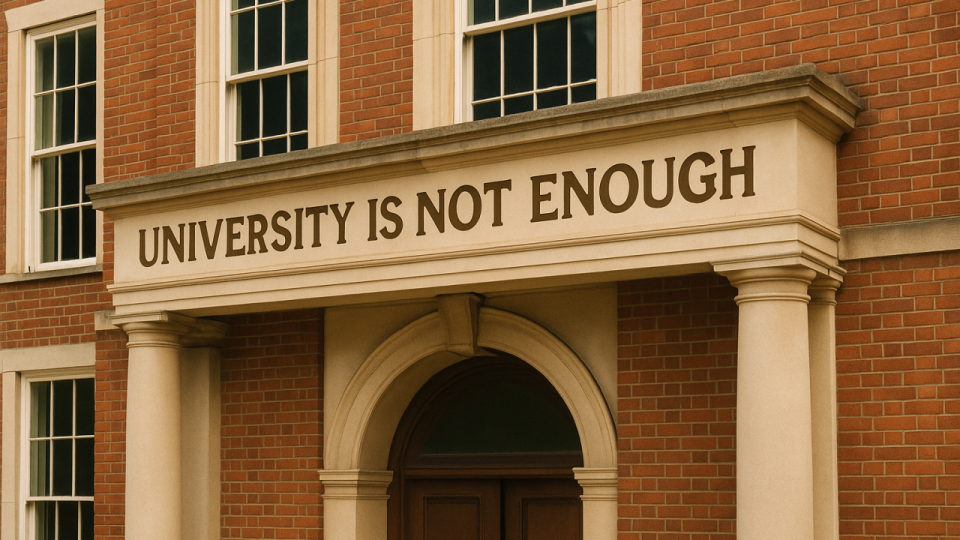University still matters, it offers structure, academic discipline, and a gateway to professional communities. But let us face the reality:
A diploma alone no longer guarantees employability.
In today’s labor market, employers are hiring for skills, mindset, adaptability, and practical experience. And they are expecting students to build these before graduation, not after.
As a consultant and coach working at the intersection of education and business, I see this gap every day: high potential students with academic knowledge but low market readiness. Why is this happening? They are simply not ready for labor market.
So, what should students be doing in parallel with their studies to truly prepare for the world of work? Here I bring some tips.

1. Shape and Maintain a Strong Professional Identity
Even as a student, you are building a professional reputation. According to the National Association of Colleges and Employers (NACE, 2023), 86% of employers review a candidate’s online presence during the hiring process.
Here is how students can start early:
- Create a “strengths and goals” development plan.
- Track your academic and personal achievements.
- Stay consistent in your areas of interest, because focus builds credibility. Wider you go less focused you are.
- Google yourself. What comes up? Shape your digital identity with intention.
- Use LinkedIn, not just as a resume, but as a storytelling platform. Gather network of people who really are present there.
- Build meaningful relationships – mentors, peers, professionals.
- Attend career events, even online. Every connection counts.
- Create a personal website or digital portfolio (especially for creative or tech careers).
Remember! Your personal brand starts before your first job. It is the story you are telling the world – one post, project, and profile at a time.

2. Focus on High-Demand Skills. Especially Outside the Curriculum
The World Economic Forum’s Future of Jobs Report (2023) identifies the most critical skills for the coming years, based on input from over 800 companies across 27 industries.
Here are the top capabilities students should be building now:
Cognitive and Soft Skills
- Analytical thinking (ranked number 1 in demand)
- Creative thinking
- Emotional intelligence (EQ) – crucial for teamwork and leadership
- Adaptability & resilience (AQ) – the capacity to thrive in change
- Effective communication – especially in concise, digital formats
Technical & Digital Skills
- Digital literacy (Excel, Teams, Google Suite, Notion, etc.)
- Data analysis (even basic skills can set you apart)
- Project management tools (Asana, Trello, MS Project, etc.)
- Design and visual tools (Figma, Canva, Photoshop)
- AI & prompt engineering – the ability to effectively communicate with AI tools like ChatGPT, Copilot, or Notion AI is becoming a core productivity skill.
A 2024 report by McKinsey shows that generative AI could automate up to 30% of work activities by 2030. Those who know how to use these tools will lead the workforce of tomorrow.
Languages & Communication
- Proficiency in English plus one or two other business-relevant languages. One foreign language is an asset, but two make difference.
- Writing for digital – emails, pitches, LinkedIn posts, Twitter-style messaging
3. Make Your Experience Count, even if it is Informal
According to Forbes (2023), internships and project-based work are among the top ways students gain employable skills. Even more valuable than academic grades in some industries.
If you are still in studying, look for experience in all its forms:
- Freelancing or volunteering
- Running a social initiative or club
- Helping family businesses with marketing or digital transformation
- Participating in startup weekends or case competitions
- Contributing to open-source projects or hackathons
- Starting a small digital product or personal brand
It is not about having a long resume or writing great summary in Linkedin. It is about showing initiative, action, and learning.
What should be visible?
- What did you do?
- What problem did you solve?
- What did you learn?
- What impact did it have?
- What values are inside?

Final Thought: The Degree Is Just a Starting Point
We live in a world where your value is not measured by your title, but by your ability to contribute, solve, adapt, and grow.
Employers from industries like tech, finance, healthcare, marketing, design, logistics, agriculture, and even traditional crafts now prioritize:
✅ Skills ✅ Curiosity ✅ Flexibility ✅ Character
So, if you are a student – your university education is your foundation, but your parallel actions will define your future.
Start building today:
- Learn to think clearly
- Communicate with impact
- Use AI, not just consume it
- Practice what you learn
- Connect with people who challenge and support you
I would love to hear what you are doing alongside your studies to build your career readiness. Share your journey or ask your questions in the comments – let’s reflect.
